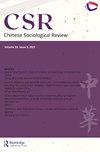Linked through the life course: core family members’ infection, COVID-19 illness severity, and the moderating role of age
IF 1.4
2区 社会学
Q2 SOCIOLOGY
引用次数: 0
Abstract
Abstract This study adopts a family life course perspective to explore the health implications of intrafamilial transmission of COVID-19, asking whether the positive diagnosis of specific core family members (i.e., spouse, parents, children) exacerbates COVID-19 patients’ illness severity and whether this impact varies by patients’ age or life-course stage. We draw on patient-level administrative data from the cities of Jinan and Shenzhen in China, where all COVID-19 patients were immediately hospitalized upon diagnosis. Using survival modeling, we found that having a spouse who is also infected with COVID-19 is predictive of significantly extended hospital stay, an effect that is stronger for older patients than for younger ones. Additionally, having an infected parent—although not child—is also associated with lengthened hospital stay, and younger patients experience significantly worse outcomes from parental-child tie infection. These results are congruent with the existing literature that expects negative consequences of family members’ illness on one’s own health. They also call for more theorizing on the evolving relationship between various forms of family connectedness and health over life-course processes.贯穿整个生命历程:核心家庭成员感染、COVID-19疾病严重程度以及年龄的调节作用
摘要本研究采用家庭生命历程视角,探讨新冠肺炎家庭内传播的健康影响,询问特定核心家庭成员(即配偶、父母、子女)的阳性诊断是否会加重新冠肺炎患者的病情严重程度,以及这种影响是否因患者年龄或生命历程阶段而异。我们利用了来自中国济南和深圳市的患者级管理数据,在这两个城市,所有新冠肺炎患者在确诊后立即住院。使用生存模型,我们发现配偶也感染了新冠肺炎可以预测住院时间显著延长,这对老年患者的影响比年轻患者更强。此外,父母感染——尽管不是孩子——也与住院时间延长有关,年轻患者因父母与孩子感染而经历的后果明显更糟。这些结果与现有文献一致,现有文献认为家庭成员的疾病会对自己的健康产生负面影响。他们还呼吁对各种形式的家庭联系与生命过程中的健康之间不断演变的关系进行更多的理论化。
本文章由计算机程序翻译,如有差异,请以英文原文为准。
求助全文
约1分钟内获得全文
求助全文

 求助内容:
求助内容: 应助结果提醒方式:
应助结果提醒方式:


